Are you left with hands smelling like the food you just cooked? This lemongrass and lavender deodorizing soap tackles tough odours, naturally! With a balanced blend of olive and coconut oil, your hands will feel soft and moisturized, left with only the bright and happy scent of lemongrass!

I have a lemongrass natural reed diffuser in my bathroom right now, and it’s so strong, I can smell it before I even reach the room! Lemongrass is known to be a scent “bully” meaning it quickly takes over in blends. As you can imagine, it’s also wonderful at tackling unpleasant odours.
I made this recipe for lemongrass deodorizing soap to help remove the garlic and onion smell from my hands after food prep. The lemongrass does not disappoint as it works hard to remove long-lasting, unwanted scents.
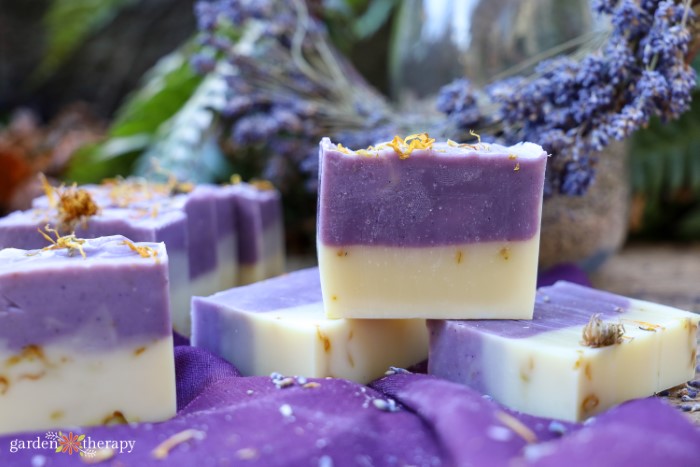
What is Deodorizing Soap?
You are certainly familiar with deodorizing soap for the shower to remove body odour. Most soap will do that job just fine, but sometimes you need a little extra power to remove odours that are clinging to your skin. A deodorizing soap helps to get rid of tough, lingering smells, that stay on skin after washing and drying.
Scents on your hands after cooking can be difficult to remove. Sometimes you can still smell these kitchen scents days later! To combat these strong scents, lemongrass is excellent at deodorizing.
For this soap, I also went ahead and added a hint of lavender to help balance the strong aroma. However, the scent is mild, with the long-lasting lemongrass scent taking charge. The oils in the soap are gentle on your skin while the essential oils are tough on kitchen odours!
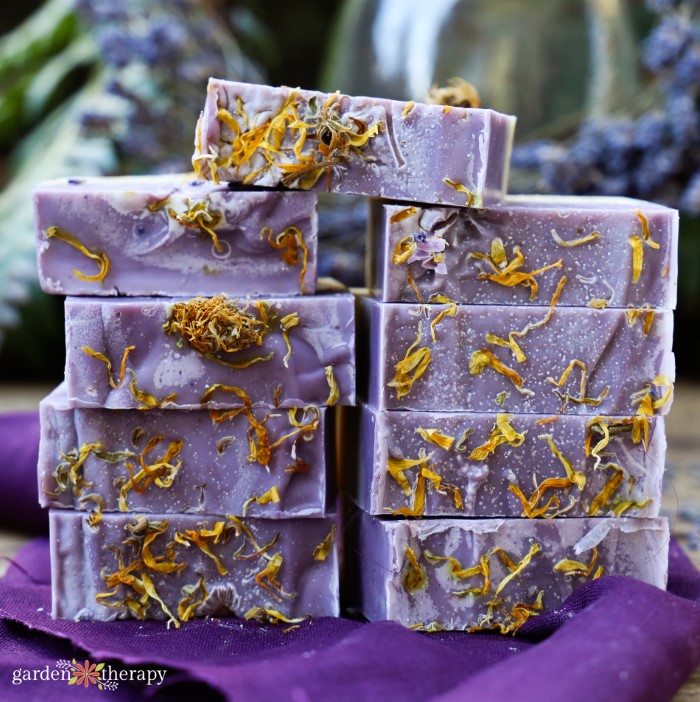
How Do I Use Deodorant Soap?
Many of my soaps are perfect for the bathroom sink or for the shower. While they also work great in the shower, I use this deodorant soap specifically for the many stinky and lingering scents that come with the kitchen.
This recipe can also be used on the body after a good workout or other moments where body odour prevails. The formulation is gentle and moisturizing for your skin and will feel amazing in the shower as well.
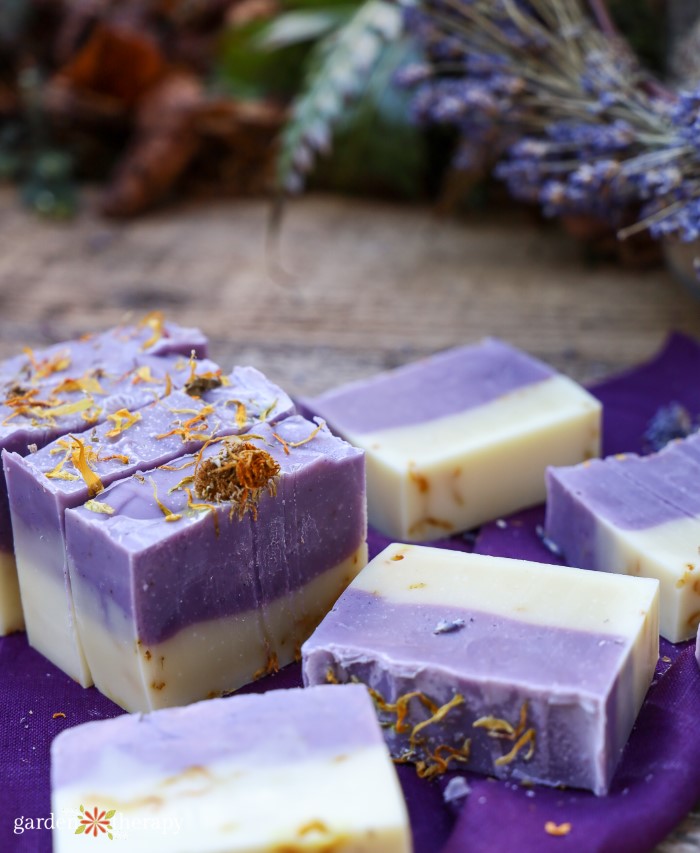
How to Make Lavender Infused Oil
Before we can get started making this lemongrass soap, you will need to make your lavender infused oil. Not only will the oil carry the lavender scent, but it will also absorb the relaxing and antibacterial properties of lavender.
For this recipe, I recommend using dried lavender buds and leaves. I like to harvest my lavender right before the buds open as they will retain the fragrance best. Allow the buds to fully dry within 2-4 weeks.
If you use fresh flowers and leaves, the oils will need to be used quickly as there is a higher chance of spoilage with fresh herbs. Allow the lavender to wilt and dry in a cool dry place for 24 hours before you infuse it.
Once you have your lavender ready, you can do one of two infusion methods: cold infusion or with heat.
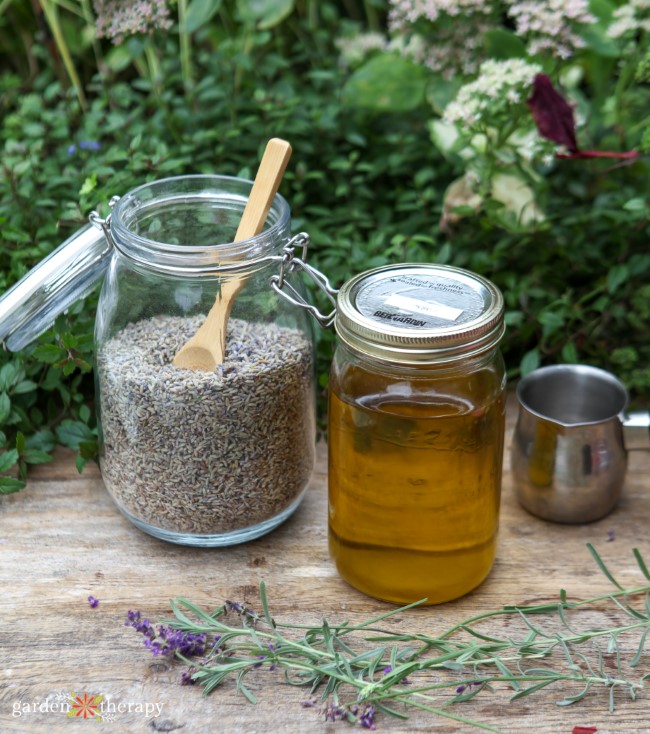
Cold Infusion
For cold infusion, you will want to pack your lavender in a jar from top to bottom. Pour olive oil in the jar and push down the lavender with a spoon to ensure that all the gaps are filled. All your buds and leaves need to be completely covered.
Secure your jar with a lid and then set in a dark place for 4-6 weeks. Once it is finished infusing, you will want to strain your lavender bits using a sieve and cheesecloth. Then your oil is ready for use!
Heat Infusion
If time is not on your side, you can also infuse your lavender over the stove top. To do so, grab a double boiler. Place an inch of water in the bottom pot. On top, heat your olive oil and lavender over medium low. Like cold infusion, you want to make sure the oil completely covers all the lavender. After the oils have warmed up, set your heat to low and wait a couple hours until the oil is aromatic. Strain your oil and then it is ready for use.
This recipe calls for 500 ml of lavender infused oil, so ensure you infuse enough oil to make your deodorizing soap.

Lemongrass Lavender Deodorizing Soap
Clean and bright, this lemongrass soap is formulated to tackle strong odours. Made with infused olive oil and coconut oil, it creates a nice lather all while keeping hands well moisturized.
The following instructions are meant for people who have made soap before. For more detailed instructions and photos on how to make cold process soap, visit my post here.
Materials
- Kitchen scale
- Infrared thermometer
- Double boiler made of stainless steel (not aluminum) soap making pitcher and a pot of water
- Pyrex or heatproof glass measuring cup (4-cup)
- Immersion blender
- Safety gear (rubber gloves, face mask, apron, eye protection, etc.)
- Loaf-style soap mold
Ingredients (see recipe card for measurements)
- lavender infused organic virgin olive oil (see above)
- organic virgin coconut oil
- sodium hydroxide
- shea butter
- lemongrass essential oil
- peppermint essential oil
- purple mica powder
- Dried calendula petals for decoration
Make It!
You are working with lye in this project, which can be dangerous. Before you get started, make sure to put on your safety gear. This includes goggles and work gloves. I also recommend you work in a well-ventilated area.
Weigh Your Ingredients
First, weigh all your ingredients. I recommend weighing using a kitchen scale for the most accurate measurements possible.
Heat the Oils
Using a double boiler, slowly heat your oils. You’ll need to use a thermometer and heat them until they reach a temperature of 115°F.
Add Lye + Blend
Add water to a 4-cup heat-resistant measuring cup. Slowly add your lye, stirring constantly until dissolved. Perform this step in a well-ventilated area and be careful not to breathe in the fumes.
To cool the lye water, place it in an ice bath.
When both the oil and lye water are at 115°F, slowly pour the lye water into the oils while blending with an immersion blender.
Blend until you reach a light trace (the consistency of pudding).
Add Essential Oils
Add in the lemongrass and peppermint essential oils, and stir them in.
Add the Purple Color
One of the most frequent questions I get asked about this soap is how to get that pretty purple color! Thankfully, it’s simple.
This soap has a layered look, so we’ll start with the natural, undyed soap. Pour out half of your uncolored soap into a silicone mold. Mix in calendula petals using a spatula, then smooth out the layer with the back of it. Lastly, spray the top with isopropyl alcohol.
Now we’re ready to add in the purple! Add your purple mica powder to the remaining soap. Make sure to blend well using an immersion blender.
Then, pour your purple-colored soap on top of the first layer. Go slow and be careful to avoid any splatters! Smooth out this layer with a spatula, then sprinkle calendula petals on top for decoration.
Allow the Deodorizing Soap to Dry and Cure
To properly cure, you’ll first need to set the mold in a cardboard box. Add extra warmth by wrapping it with towels. Place it on top of a warm surface (like the top of a fridge) for 48 hours.
After about 48 hours, unmold your soap carefully. Then, slice the soap into even bars. Place your soap on a wire rack and keep them stored in a cool, dark place to cure for 4-6 weeks. Then use and enjoy!
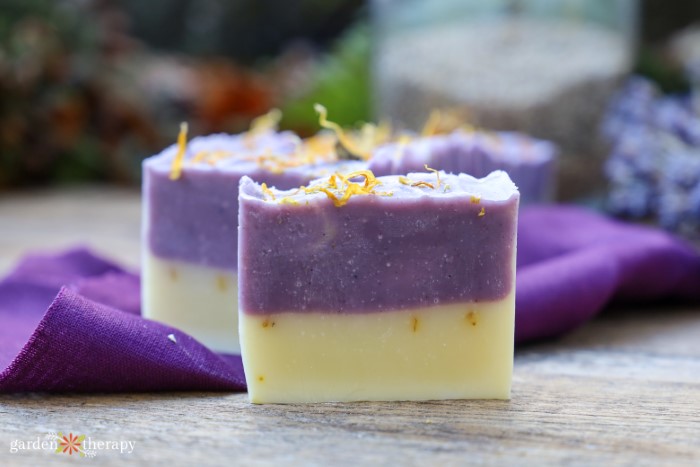
More Soap-Making Posts:
- DIY Aloe Vera Soap
- How to Make Foaming Soap
- Cold-Process All-Natural Homemade Soap
- DIY Botanical Soap Filled with Herbs, Flowers, and Greenery
- Make Wildflower Soap
Lemongrass and Lavender Deodorizing Soap
Equipment
- Double boil made of stainless steel
- Pyrex or heatproof glass measuring cup
- Safety gear (rubber gloves, face mask, apron, eye protection, etc.)
- Loaf-style soap mold
Supplies
- 500 ml (17 oz) lavender infused organic virgin olive oil
- 200 ml (7oz) organic virgin coconut oil
- 250 ml (8.4 oz) water
- 106 ml (3.6 oz) sodium hydroxide
- 15 ml (0.5 oz) shea butter
- 10 ml (.34 oz) lemongrass essential oil
- 5 ml (.17 oz) peppermint essential oil
- 1.5 tsp purple mica powder
- Dried calendula petals for decoration
Instructions
- Before you get started, put on your safety gear including goggles and work gloves.
- Weight all your ingredients precisely on a scale.
- Using a double boiler, slowly heat your oils until they are the desired temperature of 115°F.
- Add water to a 4-cup heat-resistant measuring cup. Slowly add your lye, stirring constantly until dissolved. Perform this step in a well-ventilated area and be careful not to breathe in the fumes.
- Place your lye water in an ice bath until cooled to the desired temperature of 115°F.
- When both the oil and lye water are at 115°F, slowly pour the lye water into the oils while blending with an immersion blender.
- Blend until you reach a light trace (the consistency of pudding).
- Add in your essential oils.
- Pour half of your uncolored soap into a silicone loaf mold. Mix in calendula petals with a spatula and smooth out the layer. Then, spray the top with isopropyl alcohol.
- Add your purple mica powder to the remaining soap and blend well using an immersion blender.
- Carefully pour your purple colored soap on top of the first layer. Smooth out with a spatula. Add calendula petals on top for decoration.
- Set the mold in a cardboard box and then wrap it with towels. Place it on top of a warm surface (like the top of a fridge) for 48 hours.
- After the 48 hours, unmold your soap and slice into even bars. Place your soap on a wire rack and store in a cool, dark place to cure for 4-6 weeks.

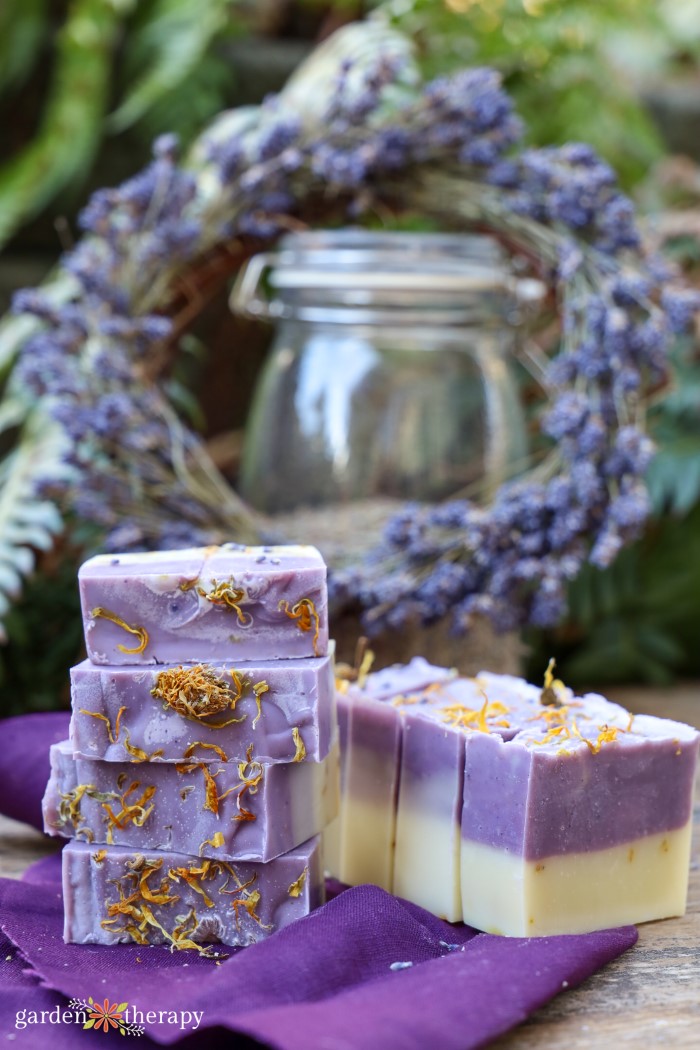
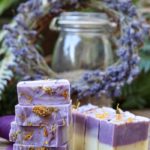
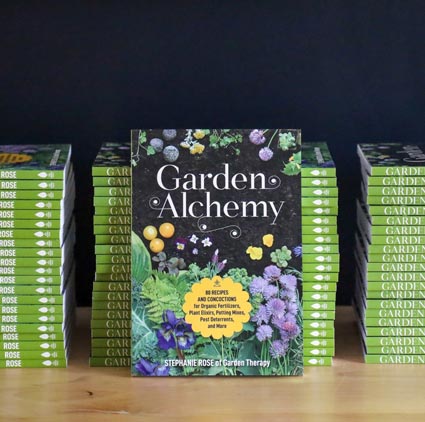


Hello. Would you new willing to sell your soap (instead of me having to male it myself)?
Hi Lisa, I’m sorry but I don’t sell my soap. I know there are a lot of wonderful soapmakers out there though. How about you search for it on Etsy?
Hi!
I found your website and love your recipes, i was just wondering if theres a way to make them in smaller quantities? Specifically the Lemongrass and Lavender Deodorizing Soap, and the charcoal soap?
You can always cut the recipe in half, but this recipe will only give you 8-10 bars anyway. So it’s already quite small batch for the effort of making soap.
Hello. I’m trying to recover from a major stroke I had back in 2014, and am wanting to get back into soap making. Before the stroke, I had only made about 4 batches, and every one was wonderful, and I love your recipe. My only question is: what would the recipe be adjusted to for a 4 lb batch? I’m seriously wanting to try this. My email is floyd.blevins@gmail.com. Thank you.